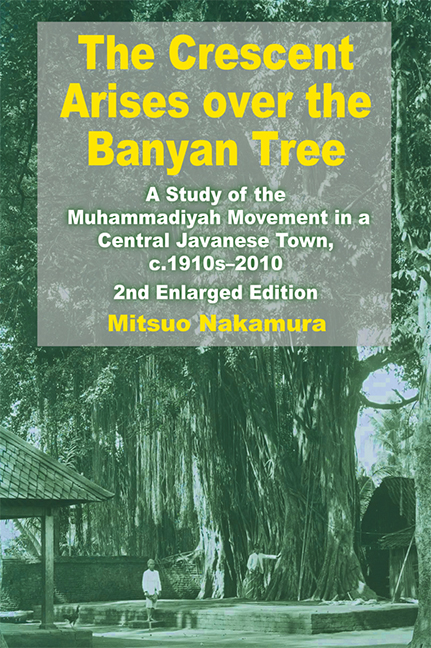 The Crescent Arises over the Banyan Tree
The Crescent Arises over the Banyan Tree Book contents
- Frontmatter
- Dedication
- Epigraph
- Contents
- List of Figures and Maps
- List of Tables
- List of Boxes
- Foreword to the Second Edition
- Preface to the Second Edition
- Foreword to the First Edition
- Preface to the First Edition
- Notes
- Map
- PART I DEVELOPMENT OF THE MUHAMMADIYAH IN KOTAGEDE, c.1910s–1972
- 1 Introduction: The Islamization of Java
- 2 Kotagede under the Banyan Tree: Traditional Society and Religion
- 3 The Beginning of the Muhammadiyah: Court Religious Officials and the Urban Middle Class
- 4 The Development of the Muhammadiyah: Religion and Social Action
- 5 The Sociology of Ummat Islam: Structure and Anti-Structure
- 6 The Ideology of the Muhammadiyah: Tradition and Transformation
- 7 Conclusion: Re-Islamization of Java
- Postscript to Part I
- PART II KOTAGEDE REVISITED, 1972–2010
- Bibliography
- Glossary
- Appendices
- Index
- About the Author
Postscript to Part I
from PART I - DEVELOPMENT OF THE MUHAMMADIYAH IN KOTAGEDE, c.1910s–1972
Published online by Cambridge University Press: 21 October 2015
- Frontmatter
- Dedication
- Epigraph
- Contents
- List of Figures and Maps
- List of Tables
- List of Boxes
- Foreword to the Second Edition
- Preface to the Second Edition
- Foreword to the First Edition
- Preface to the First Edition
- Notes
- Map
- PART I DEVELOPMENT OF THE MUHAMMADIYAH IN KOTAGEDE, c.1910s–1972
- 1 Introduction: The Islamization of Java
- 2 Kotagede under the Banyan Tree: Traditional Society and Religion
- 3 The Beginning of the Muhammadiyah: Court Religious Officials and the Urban Middle Class
- 4 The Development of the Muhammadiyah: Religion and Social Action
- 5 The Sociology of Ummat Islam: Structure and Anti-Structure
- 6 The Ideology of the Muhammadiyah: Tradition and Transformation
- 7 Conclusion: Re-Islamization of Java
- Postscript to Part I
- PART II KOTAGEDE REVISITED, 1972–2010
- Bibliography
- Glossary
- Appendices
- Index
- About the Author
Summary
The reality of Islam is a personal, living faith, new every morning in the heart of individual Muslims.
(Wilfred C. Smith 1957, pp. 17–18)1. My stay at Harvard University, September 1981 to June 1982, as a visiting scholar of the Department of Anthropology and the Center for the Study of World Religions, has caused delay in the publication of this book for more than a year. I must apologize for this to the publisher and whomever else concerned.
2. At Harvard I was initiated into Qur'anic Arabic. I was also exposed to introductory courses in Islamic studies and comparative religion. My newly acquired knowledge, although still meagre, has enabled me to see my previous experience with the Muhammadiyah in Kotagede in a new perspective. I now realize a number of errors and shortcomings contained in this book. Most of them are of such nature that I took matters of universal significance in Islam and the Muslim world as something peculiar to the Muhammadiyah in Kotagede or Islam in Java. At the same time, I now feel assured of the basic soundness of my approach — to take Islam seriously as a religion.
3. I am encouraged by favourable comment on my original dissertation coming from a leading Indonesianist (McVey 1981). I am also heartened to observe growing interest among young Indonesian scholars in the empirical study of religious developments in Indonesia. Their contribution includes two recent sarjana theses by Kotagede students (Hazim 1977 and Charris 1979). Perhaps the “intellectual stagnation” I mentioned in the Preface applies only to Western or more precisely American scholarship which seems still enchanted by Geertzian paradigms.
4. I would also like to mention a brief but important contribution by H. Zaini Ahmad Noeh, a senior official of the Department of Religion. In his introduction to the Indonesian translation of Daniel Lev's Islamic Courts in Indonesia (Peradilan Agama di Indonesia, Jakarta: Intermasa, 1980), he emphasizes, among other things, the duality of penghulu officials in the indigenous Javanese polity as “kyai in the circle of priyayi, and also conversely priyayi in the circle of kyai” (ibid., p. 7).
- Type
- Chapter
- Information
- The Crescent Arises over the Banyan TreeA Study of the Muhammadiyah Movement in a Central Javanese Town, c.1910s-2010 (Second Enlarged Edition), pp. 212 - 214Publisher: ISEAS–Yusof Ishak InstitutePrint publication year: 2012


